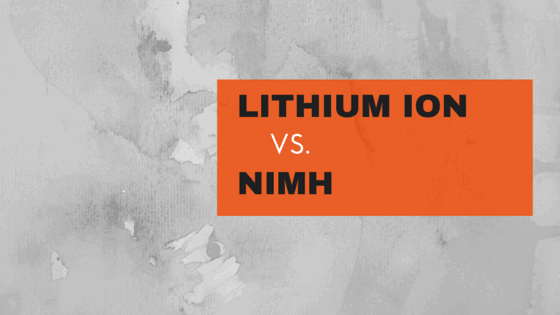We're all looking for batteries that can do the job.
Whether we're talking power tools or just little things around the house, we like when a battery has the power needed and lasts a long time.
Today we're going to highlight the pros and cons of both the lithium ion battery and NiMH batteries, so you can make an informed decision.
Lithium Ion Batteries - Quick Summary
- Hold charge for long time
- Stay charged in storage
- More voltage per cell
- Always rechargeable
- Not available in all sizes
- Different chargers for different batteries
Benefits of lithium ion batteries
Lithium ion batteries are basically rechargeable batteries. However unlike their previous models that used lithium in its pure metallic state, lithium ion is made of various compounds.
They've become more widely used in power tools, smart phones, and even electric cars because of their ability to recharge and hold a charge. To learn more, check out this short video:
One major benefit that is clear when you use lithium ion batteries in various power tools is that they offer more energy density than most rechargeable batteries in the market.
These batteries also operate at a higher voltage of around 3.7 volts.
This fact makes it possible for one to use a single cell to produce much more voltage than a NiMH battery. The complex design that is used in the manufacturing process of the lithium ion battery ensures that there is inclusion of a special circuitry system which protects the battery from overcharging.
This design also allows the battery to hold on its charge for a long period of time, even when in storage.
Cons of lithium ion batteries
Unfortunately this batteries are not available in their standard sizes that are used in some tools like AA,C and D. They also require specific, sophisticated chargers in order to charge them. The use of the wrong charger can lead to leaks and other ugly problems.
NiMH Batteries - Quick Summary
- Available in many sizes
- Low voltage operation
- Cheap to replace
- Runs at full strength for life of the charge
- Loses charge in storage
- Voltage depletion over time
Benefits of NiMH batteries
Ideally NiMH batteries operate like any other alkaline battery, with a few adjustments to it to make it more efficient.
They do operate at a lower voltage in comparison to lithium ion batteries at 1.2 volts. This translates to the need of using several cells to give off the same amount of voltage, compared to a lithium ion counterpart.
NiMH batteries are known for their ability to power devices for a longer period of time compared to most other batteries. Their voltage power also does not falter like most rechargeable batteries and stays at a constant voltage regardless of the remaining charge level.
So you can expect full power while the charge lasts - which is a big deal.
NiMH batteries are not that sophisticated, which means that they are available in standard sizes like AA, C and D and hence available for use in everyday products as well as power tools.
They are also generally cheaper to buy and replace, which is a bonus.
Cons of the NiMH batteries
Unfortunately NiMH batteries are known to lose 1 to 5% of charge a day when in storage.
This fact means that you'll need to charge right before you use it, which isn't always convenient in a more "sudden" situation. Many people also believe that the NiMH batteries suffer from 'memory effect' which technically is incorrect.
The batteries however do suffer from voltage depletion and voltage depression - a fact that is often confused as having a memory effect, which is caused by recharging batteries that haven't been fully discharged, causing them to develop lower voltage power.
With a correct charging and storing system, this really shouldn't be a concern for you.
Lithium ion vs. NiMH batteries - Which is better?
So we are back to the original question.
Between the two which type of battery is better to use? Well the answer largely depends on what power tool you are using it for. Even though lithium ion batteries have some obvious advantages, they may not be available in the size you need (obvious deal-breaker) and they tend to be more expensive.
NiMH batteries on the other hand require more maintenance/replacement but also work well for most jobs. They are also relatively cheaper to buy, which is a big plus for NiMH
Related Resources
http://news.uic.edu/beyond-the-lithium-ion-a-significant-step-toward-a-better-performing-battery
http://news.mit.edu/2015/manufacturing-lithium-ion-battery-half-cost-0623
http://batteryuniversity.com/learn/article/nickel_based_batteries


Li-ion batteries are too available in AA and AA rechargeable!!